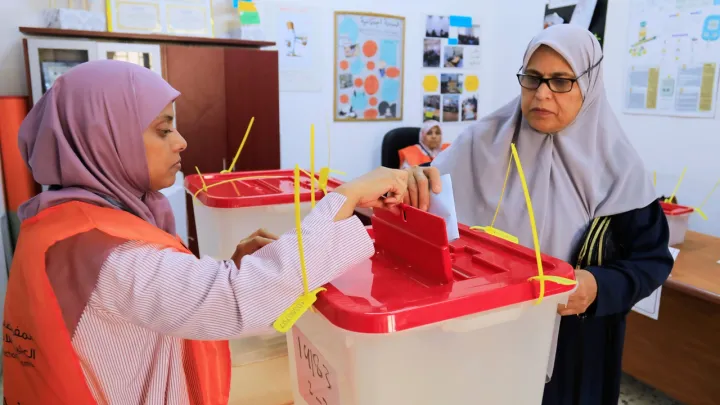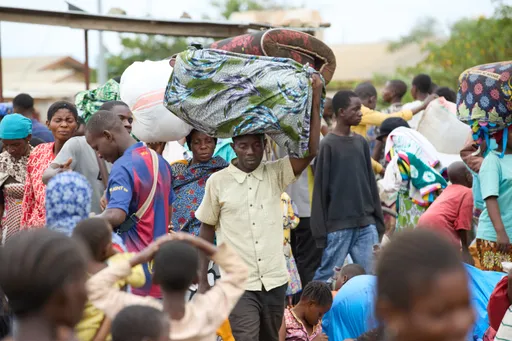By Brian Okoth
For the first time in three East African nations’ history, a continental football tournament will be held jointly in the region by Kenya, Tanzania and Uganda.
The three countries’ joint bid to host the 2027 Africa Cup of Nations (AFCON) was approved and a communication made on Wednesday.
Morocco will host the 2025 competition, while the delayed 2023AFCON will be held in Côte d'Ivoire from January 13 to February 11, 2024.
Tanzanian senior opposition politician Zitto Kabwe welcomed the AFCON hosting announcement, saying it was "very, very good news" for East Africa.
"It marks a major milestone for our three countries, and it will also cement the integration of the East African Community," Kabwe told TRT Afrika.
Kenyan Member of Parliament Caleb Amisi said hosting AFCON in 2027 is "a good thing" for the region.
“Many foreigners will come to Kenya, Tanzania and Uganda in 2027 for the games. This will boost the countries' foreign exchange reserves, create an avenue for local companies to advertise themselves to the world, and promote the three nations’ international profile,” Amisi told TRT Afrika.
The previous tournament, 2021 AFCON, was held in Cameroon, and won by Senegal, who beat Egypt 4-2 on post-match penalties.
From the larger Eastern Africa region, only Sudan and Ethiopia have managed to stage the tournament.
Sudan and Ethiopia
Sudan hosted the inaugural AFCON tournament in 1957 and again in 1970. Ethiopia hosted the 1962 and 1976 competitions.
Egypt holds the record for the highest number of successful AFCON hosting bids – five. The North African nation hosted the tournament in 1959, 1974, 1986, 2006 and 2019.
Ghana follows Egypt with four successful hosting bids – in 1963, 1978, 2000 and 2008. Tunisia is third with three bids – in 1965, 1994 and 2004.
Several countries, including Libya, Algeria, Angola, Mali, Senegal, Burkina Faso and Morocco, have hosted the continental tournament once so far.
But what are the benefits of hosting the continental tournament?
Automatic qualification
Tanzania has played in two AFCON tournaments – in 1980 and 2019. Uganda is the most successful East African nation in the AFCON tournament. The country has featured in seven AFCON competitions.
In 1978, the East African nation were the runners-up, losing 2-0 to Ghana in the AFCON finals played at the Accra Sports Stadium in Ghana. The other times Uganda has featured in AFCON are 1962, 1968, 1974, 1976, 2017 and 2019.
Kenya has appeared in six AFCON tournaments – in 1972, 1988, 1990, 1992, 2004 and 2019. The country has never advanced beyond the group stages.
Now that the three nations will jointly host the 2027 AFCON games, they will be spared the challenge of qualifying through the preliminary matches.
The Confederation of African Football (CAF) says on its website that host nations "automatically qualify to play in the African Cup of Nations."
The nations that qualify for the AFCON games receive approximately $600,000 each in cash. The top four teams, however, get more money.
Cameroon got $4 million for winning the 2017 AFCON, while the runners-up Egypt got $2 million. Semi-finalists Burkina Faso and Ghana took home $1.5 million each.
Senegal, who won the 2021 AFCON, received $5 million from CAF, while runners-up Egypt got $2.75 million.
Tourism boost
Several studies show that whenever a nation hosts a major tournament such as AFCON, there is a positive impact on the country’s tourism sector. The phenomenon is known as sports tourism.
In a February 2023 study published by the University of Johannesburg, South Africa analysing the tourism impact of Cameroon’s 2022 hosting bid, the authors Siyabulela Nyikana and Tembi Tichaawa say: “Lasting memories of the local destinations may trigger repeat visitation and thus grow local tourism numbers.”
When Egypt hosted the 2019 AFCON, the International Monetary Fund (IMF) said the North African nation’s tourism sector was boosted several-fold as a result of the competition. Revenue linked to the tournament alone stood at $83 million.
Twenty-four (24) countries take part in AFCON games. This means that tens, if not hundreds of people, travel with their respective teams to the host nation.
The media employees, sponsorship companies, football lovers, and foreign tourists flock to the host nation for the event, thus boosting local tourism.
Tourism, especially wildlife, is a major foreign exchange earner for Kenya, Uganda and Tanzania. The nations will hope to capitalise on the high tourist traffic in 2027 to earn even more from the AFCON-motivated visitations.
Improved stadia
For a nation to qualify to host the AFCON tournament, it must meet CAF-set stadia standards.
CAF requires that the AFCON host nation, or countries, must have at least six stadia, with two that can hold at least 40,000 fans, another two that can hold 20,000 fans, and two that can hold at least 15,000 fans.
Before hosting rights are allocated to a certain nation, CAF sends its officials to evaluate the quality of its stadia.
This means that if a nation had sub-standard stadia before, it would be forced to rehabilitate or improve them to meet the CAF standards. In the long run, this ensures that a country has quality stadia, even after hosting the tournament.
Kenya has fronted the Nyayo National Stadium, the Moi International Sports Centre Kasarani (both in the capital Nairobi) and the Kipchoge Keino Stadium in the Rift Valley town of Eldoret as the facilities to be used in the AFCON 2027 games.
Tanzania will use the Benjamin Mkapa National Stadium and possibly the Azam Sports Complex, both in the commercial capital Dar es Salaam, for the AFCON tournament.
Uganda, on the other hand, will use the 45,000-seater Nelson Mandela National Stadium, Namboole in the capital Kampala for the games.
The three nations embarked on renovating the stadia after submitting their joint AFCON hosting bid in May.
Improved infrastructure
CAF demands that host nations must provide secure environments while hosting the AFCON games.
This often forces the hosts to improve road networks, street lighting and communication infrastructure.
For instance, when Cameroon hosted the 1972 AFCON, the country witnessed a significant improvement in its stadia standards and the accompanying infrastructure, which benefited the country for many years to come, Nyikana and Tichaawa of the University of Johannesburg say in their study.
The years of planning and investment see host nations commit a significant amount of their budgets to infrastructure development and the revamping of social amenities.
Nation’s profile
There is empirical evidence suggesting that nations that host regional, continental or global events enjoy an improved international reputation.
A 2010 study conducted by Geir Gripsrud and Erik Nes of the BI Norwegian Business School shows that a country’s image may be changed by hosting international events, and country image dimensions are in turn "related to product image and behavioural intentions regarding product purchase and tourism."
The two authors, however, emphasised that "proper management" of the international games is the only sure way of improving a host country’s international profile.
"There is no guarantee that the image of the host country will improve. It may actually deteriorate," they said in their study.
























